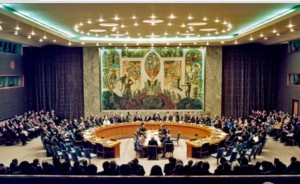FREE FLOW OF INFORMATION
Based on news from various news services as indicated by the links
Meeting on May 2 at the United Nations, the ambassadors making up the Intergovernmental Negotiations on Security Council reform clashed on the question of enlarging the Council to include more permanent members. When the UN was founded in the rubble of World War II, the five victors — Britain, China, France, the Soviet Union and the US — assumed for themselves permanent council memberships and veto powers. According to the ambassador, their “special powers are a holdover from 1945 in a world that has dramatically changed with the rise of new powers and the UN itself increasing its membership by nearly three times, from 51 to 193.”

The chamber of the United Nations Security Council
Click on photo to enlarge
The ambassador from India called for the addition of new permanent members, referring to a negotiating document which is based on a survey of UN members on council reforms. Of the 122 countries that made written submissions for the survey, 113 — or more than 90 percent — supported expanding both categories of council membership, he said. They include the 54 members of the African Union, 42 from the L.69, which is a group supporting reforms, the Caribbean Community (CARICOM) members, the G4 and 21 others, in addition to two permanent members, Brtain and France, he said. He spoke on behalf of India, Brazil, Germany and Japan, the so-called G4 group.
Pakistan objected to the proposal by India that it should be added as a permanent member of the Council, along with Brazil, Germany and Japan, the so-called G4 group.
And the Democratic People’s Republic of Korea strongly opposed permanent membership of Japan – another member of the G4.
A 13-member group known as Uniting for Consensus (UfC), which included Pakistan and is led by Italy, reiterated its opposition to adding any permanent members, the core of its position on the reform process.
(Article continued in the column on the right)
Can the UN help move the world toward a culture of peace?
(Article continued from the column on the left)
Another approach was proposed by the Ambassador from Ireland, as follows:
In relation to today’s topic of “categories of membership”, Ireland is not convinced by arguments for the creation of new permanent members of the Council. Democratic accountability is a watchword for almost every global institution. The Security Council should be no different. To create new permanent seats – which would not be subject to periodic election by the membership – would risk compounding many of the problems of the present dispensation.
At the same time, we fully recognise that there are countries which, due to their ability to contribute significantly to the maintenance of international peace and security, should be able to play a stronger role on the Council than allowed by the current arrangements. For this reason, although we are open to considering various models for expansion, we are positively disposed towards the creation of a new category of seats with an 8 year term. Ireland believes there should be 6 seats in this category, with 2 each from the African and Asia-Pacific group, and 1 each from WEOG and GRULAC.
We also believe an expansion of the current category of 2 year seats is warranted, including to ensure that smaller states can continue to serve regularly on the Council. These should increase by 5 to 15, with the African group taking 2 of the new seats, and the Eastern European group, the AsiaPacific group and GRULAC taking 1 each.
It would be for further consideration whether seats in either of these categories would be eligible for immediate re-election. The overall regional breakdown of seats under the model outlined above would result in 7 Council members from Africa, 6 members from WEOG, 6 from Asia Pacific, 4 from GRULAC, and 3 from Eastern Europe.
This would result in a Council of 26 seats, which would, in our view, be a good balance between representativeness and efficiency. As previously outlined, we continue to favour eventual abolition of the veto, and, as we would do not favour creating any new permanent members of the Council, the extension of the veto to any new member does not arise.
So does the Irish proposal accept the present permanent five or not?
If it does not then how can they be evicted ?
If it does accept the continuance of the permanent five then membership is 31 and not 26 . Both numbers are really too large and would prolong discussion and delay action.
On the security front there is far too little action now, viz: Syria. On all other questions there are usually too few resources being offered.
Overall then the Irish proposal might be more representative but less effective.